|
|
|
Sort Order |
|
|
|
Items / Page
|
|
|
|
|
|
|
| Srl | Item |
| 1 |
ID:
164889
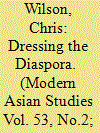

|
|
|
|
|
| Summary/Abstract |
This article analyses the dress practices of East African Indians from the late nineteenth century to the middle of the twentieth century, which have failed to attract much scholarly attention. It begins by examining the ways in which very material interactions with items of clothing, while separated from the body, were productive of identities and communities among Indian tailors, shoemakers, Dhobis, and others in East Africa. It then turns away from a specific focus on questions of identity to consider the ways in which dress was incorporated into the diasporic strategies of East African Indians as they sought to negotiate the Indian Ocean world. Finally, it explores how, where, and when Indians adopted particular dress practices in East Africa itself, to illuminate the role of dress in orderings of space, colonial society, and gender. The analytic value of dress, this article contends, lies in its universality, which allows for the recovery of the everyday lives and efforts of ordinary East African Indians, as well as a new perspective on elite diasporic lives.
|
|
|
|
|
|
|
|
|
|
|
|
|
|
|
|
| 2 |
ID:
120007
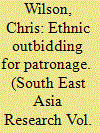

|
|
|
|
|
| Publication |
2013.
|
| Summary/Abstract |
Do local systems of patronage in Indonesia cause or prevent intercommunal violence? In analysing the September 2010 ethnic riots in Tarakan, East Kalimantan, this article illustrates one mechanism by which clientelism can lead to violent communal conflict. Ethnic organizations claiming to represent the marginalized indigenous community engaged in a form of 'ethnic outbidding' in order to intimidate their way into local patronage networks. Apparent leadership of an aggrieved indigenous community gave organizations access to state resources that they would not otherwise have had. In order to sustain this status, however, these organizations were obliged to respond vigorously to any apparent insults to the community, thereby increasing the risks of intercommunal conflict.
|
|
|
|
|
|
|
|
|
|
|
|
|
|
|
|
| 3 |
ID:
154457
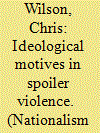

|
|
|
|
|
| Summary/Abstract |
Spoilers of peace agreements are normally seen as motivated by utility maximization, their actions intended to gain a larger proportion of postconflict political power or economic wealth. In this article, I examine this perspective via a comparative analysis of two cases of spoiler violence in Assam, India, one involving a spoiler excluded from the agreement and the other a spoiler central to the peace process and the postconflict political and economic milieu. Both cases suggest that some spoiling action following peace agreements is less instrumental and driven more by emotional and ideological phenomena than this leading understanding suggests.
|
|
|
|
|
|
|
|
|
|
|
|
|
|
|
|
| 4 |
ID:
165585
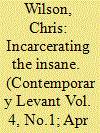

|
|
|
|
|
| Summary/Abstract |
Although much has been written about counterinsurgency, policing, and incarceration under the British mandate in Palestine, little work has been done on those who entered the ambit of the carceral system as ‘criminal lunatics’. Criminal lunatics – the term used at the time to specifically designate those found ‘guilty but insane’ by the mandate’s criminal courts, and retained throughout this article both for the sake of analytic clarity and to avoid misdiagnosing individuals by the retrospective imposition of contemporary medical terms – confounded the mandatory government by potentially falling under the responsibility of both its criminal-legal and medical wings. While the focus in the wider scholarship on psychiatry has often been on its expansionist appetites, the struggle over responsibility for criminal lunatics in mandate Palestine offers a case study in the reverse; an attempt to abdicate, not aggrandise, as the health department staved off repeated efforts to make them take responsibility for these cases. This article traces these disputes, and the development of a distinct institutional landscape attendant on their outcome. But the fate of criminal lunatics was not merely determined by debates internal to government; families were important interlocutors too, who variously sought the release of their incarcerated mentally ill relatives, or – more worryingly for the mandate – exploited the criminal-legal system as a back-door to the overcrowded and underfunded government mental institutions. Far from seeing psychiatry as a tool of social control, the government expressed concern about the potential misuse of psychiatric ideas, processes, and institutions by Palestinian families as a way to escape obligations to mentally ill relatives. Foregrounding these fraught contestations brings into focus the sharp limits of the mandate’s ambitions in the sphere of the intimate, and the attempts of some Palestinians to expand those limits for their own ends.
|
|
|
|
|
|
|
|
|
|
|
|
|
|
|
|
| 5 |
ID:
188107
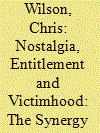

|
|
|
|
|
| Summary/Abstract |
Western countries are experiencing a wave of violent attacks against places of worship, stores, schools and other crowded locations. The perpetrators of these attacks explain their actions as necessary to stem an “invasion” of immigrants which threatens the very existence of the white race. At the same time, many of the same countries have experienced very similar attacks motivated by a particularly contemporary form of misogyny. Known as incels, an abbreviation of involuntary celibate, young men in this community believe they are denied sexual partners by feminism and societal norms of male attractiveness. These two series of attacks are generally understood to be separate (if overlapping) forms of extremism. In this article I contend that the concepts of white genocide central to white nationalism and misogynistic incelism are more intertwined than it appears. Misogyny and the notion of white genocide are mutually escalatory. Rather than separate and complementary forms of extremism, the two ideologies converge to create a single more volatile worldview, one which makes its proponents more prone to the use of violence. Misogyny and white genocide are synergistic, their effect greater than the sum of their parts.
|
|
|
|
|
|
|
|
|
|
|
|
|
|
|
|
| 6 |
ID:
145752
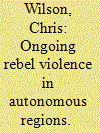

|
|
|
|
|
| Summary/Abstract |
In the large body of literature on the granting of regional autonomy to end insurgency, an important related question has received little attention: what happens to other ethnic groups within the autonomous region? The new arrangement may end violence between the state and the guerrillas but will the latter simply turn their guns on other groups in the area? This article begins to fill this gap in the literature through a close examination of two mass killings conducted by rebels awarded an autonomous region in western Assam, Northeast India. Why would these militants—having won such far-reaching political and economic rewards after a decade of civil war—continue violence and risk these hard-won gains? I propose that violence against other ethnic communities in the new region is more likely in the presence of two main conditions. First, when the community receiving autonomy is a minority in the new region, and second, when only one militant faction is awarded power.
|
|
|
|
|
|
|
|
|
|
|
|
|
|
|
|
| 7 |
ID:
108927
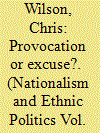

|
|
|
|
|
| Publication |
2011.
|
| Summary/Abstract |
Why people follow the incitement of powerful individuals to participate in collective violence remains one of the most intriguing questions in the study of conflict. By using process-tracing to analyze in detail a violent ethno-religious conflict in Indonesia, this study concludes that rioters are often not provoked by elite propaganda but rather are acting out of their own interest. However, their violence sets off a chain of events that causes large-scale communal conflict. This escalation is most likely in the presence of three causal mechanisms: the immobilization of local security forces; widespread sentiments of sympathy for innocent victims; and the creation of intense feelings of insecurity.
|
|
|
|
|
|
|
|
|
|
|
|
|
|
|
|
| 8 |
ID:
165075
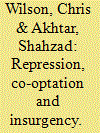

|
|
|
|
|
| Summary/Abstract |
Scholars have long identified state repression as playing a key role in the onset of insurgency. Violence by security forces increases anger against the state and assists with rebel recruitment. Yet scholars have also recognised that repression does not always lead to rebellion: in some cases it successfully quashes movements before they have begun. This study advances an argument for when and why repression leads to insurgency and sometimes does not. We contend that violence by state security forces can fail to trigger rebellion if local elites within the repressed community are simultaneously co-opted with political and economic opportunities. When elites are satisfied with local autonomy and patronage they deprive the dissident movement of local leadership and coordination. When the state uses repression against a community and at the same time abandons this mutually beneficial relationship, the insurgency has both the leadership and grassroots support it requires. We illustrate our argument by examining three cases of state violence in Asia. In two of our cases, Pakistan’s Federally Administered Tribal Areas (FATA) and Southern Thailand, repression led directly to insurgency. In the third, Papua in Indonesia, ongoing co-optation of local elites has left the movement factionalised and weak.
|
|
|
|
|
|
|
|
|
|
|
|
|
|
|
|
| 9 |
ID:
181270
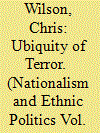

|
|
|
|
|
| Summary/Abstract |
Despite ongoing debate, most definitions of terrorism agree that it involves violence against civilians by state or non-state actors intended to send a broader message to an audience well beyond the victims. The targeting of civilians to achieve a political or other goal is widely considered to differentiate terrorism from other forms of political violence. But as this article shows, many other forms of political violence against civilians by both state and non-state actors also hold communicative intent, including hate crimes, riots, group violence during and after conflicts and mass killing and genocide. Despite this, these forms of violence are rarely classified as terrorism. I contend that the concept of terrorism fails to differentiate between many forms of political violence. This article contends that the frequency with which militant actors (both state and non-state) use violence against civilians to intimidate and influence a broader audience means that the term terrorism should be abandoned in favor of a less emotive and selectively applied term. I propose the term Politically Motivated Killing of Civilians.
|
|
|
|
|
|
|
|
|
|
|
|
|
|
|
|
|
|
|
|
|